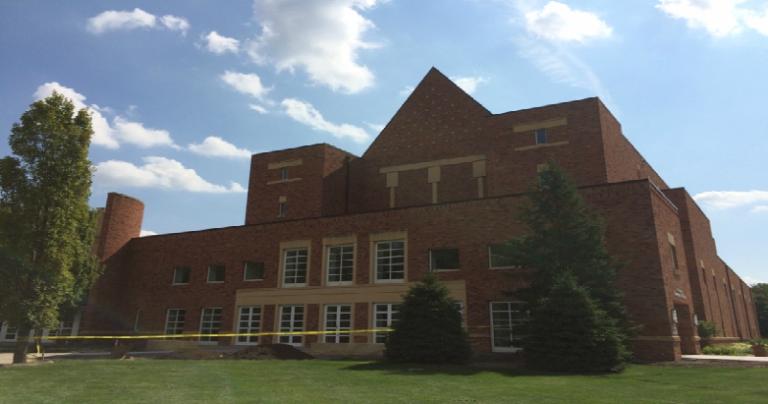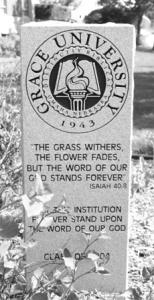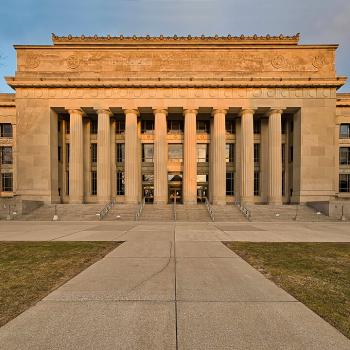I’ve often said that I try to approach blogging as “thinking in public.” But this post, I’m afraid, will be more like me having a bad dream in public.
The dream starts peacefully enough, with a person who loves what he does.
That’s me. As a history professor at a Christian university, I get to teach a wide array of courses with a diverse group of students who are generally serious, hard-working, and earnest. But it gets better: my best friends in life come from among my colleagues at work, and I receive ample recognition for the various kinds of writing and research I do, and I even like my bosses, who do much that I don’t see to protect my academic freedom from people who see faculties like ours as harboring heretics.
It’s better than a dream: I am blessed beyond imagining to do meaningful, decades-long work that accords strongly with my sense of Christian vocation. I don’t need to compartmentalize my passions for history and the liberal arts from my love of God and neighbor.
By every standard developed in a University of Notre Dame study that my friend, pastor, and co-author Mark Pattie shared last month in an adult Sunday School class, I am thriving:
- I believe I have purpose and am living a meaningful life.
- I believe I’m making significant contributions to our world.
- I have a clear understanding of my talents and gifts.
- I feel I’m living an authentic life, in accord with my true self.
But I’m not sure that I will continue to believe and feel those things in the future — for the paradoxical reason that I’m less and less sure that what we might broadly define as Christian scholarship can thrive in Christian colleges and universities. This is where the dream starts to turn into a nightmare…

Into my idyll creeps the nagging possibility that many colleges and universities, of various sorts, will not survive the economic, demographic, technological, political, legal, and other challenges they currently face. (And I actually wrote that sentence before details of the Republican tax plan came out. This has been a long-gestating post.) Those schools that have already closed this century have tended to be very small or committed to missions even more specialized than the Christian liberal arts, but it’s all too easy to imagine a new wave of closures swamping larger institutions.

(Perhaps one precipitated by a new, deeper recession and/or a large-scale military conflict, historically two of the most common causes of such closures. And both more likely than we’d like to imagine.)
Christian colleges and universities (especially as that term refers to broadly evangelical schools, but maybe also smaller Catholic and other church-related colleges) seem especially susceptible to this threat. Historically dependent on the ability of middle-class families to pay tuition or take on the risk of debt, they find themselves facing a near-future in which that demographic is shrinking. And they can’t count on the level of denominational support that kept them afloat through earlier lean times.
Such a mass-closure scenario would be absolutely wrenching. But no Christian ought to fear it.
We do not put our faith in any mortal individual, group, or institution but in the person of a resurrected Savior who overcame death. The history of our religion is replete with examples of Christian communities and organizations that came to an end; none of their demises meant the demise of the Church or the failure of God’s mission.
Indeed, those tragedies might have sown the seeds for new growth. (Cue someone to read John 12:24.) In my denomination, I’ve heard it estimated that every older church that closes ultimately plants ten new churches, as its redistributed assets support the launch of new congregations.
“We have nothing to fear from technological, economic, cultural, political, or legal change,” I told Christian college presidents gathered at Wheaton a few years back, “nothing to fear, that is, but our demise as institutions that may potentially outlive their missional utility.” I think the words Mark quoted from Catholic writer Ronald Rolheiser may be pertinent to institutions as well as individuals:
Like Jesus, we too are meant to give our lives away in generosity and selflessness, but we are also meant to give our deaths away, not just at the moment of our deaths, but in a whole process of leaving this planet in such a way that our diminishment and death is our final, and perhaps greatest, gift to the world.
So it’s not actually the potential for institutional demise that keeps me up at night.
My deepest, darkest concern is that our leaders are so (understandably) loathe to accept this possibility that they’ll instead be tempted to do whatever they can to ensure their institutions’ survival:
• Tempted to shift emphasis to new programs that promise more tuition-paying customers a safe investment, even as they neglect the disciplines that actually make up the core of a model of education built on intellectual risk and adventure.
• Tempted to cut costs by hiring more and more adjunct faculty, who are compensated more and more meagerly. And those of us who are full-time and tenured will then be tempted to stay silent, lest our own teaching loads increase and we have even less time for research and public scholarship.
• Tempted to ally with politicians who use their power recklessly to the short-term benefit of Christian colleges — and the detriment of the common good.
(Or at least to acquiesce to such false leaders. Few will be so brazen as the president of the largest Christian university in this country.)
• Tempted to stay quiet in moments demanding a prophetic witness, lest donors, prospective families, affiliated churches, and others who pay the bills and fill governing boards be offended. Or to hush questions emerging from honest scholarly inquiry, since they interrogate some of those core constituents’ longest-held assumptions.
• Tempted to pledge for those audiences that they will resist accommodation to a world whose values are inimical to those of Christianity — even as they find themselves secularizing in a myriad of other ways, linking the survival of their institutions to the entrenchment of economic, political, social, and other structures that oppose the kingdom of God.
And let me confess that when I say They, I also mean I.
More than any particular current president or provost, I’ve got in mind a potential future self who has moved from the faculty to the administration. It’s not something I’m actively seeking to do, but it is a change I’ve been contemplating in recent years.
And I see no reason to think that I’d be immune from the aforementioned temptations.
Which is when I wake up from the nightmare, having become the very person afflicting my dreams.
* * * * *
So please pray that our leaders — that I, should that future transpire — will resist those temptations. Pray that they’ll instead be led to cast courageous, compelling visions for Christian higher education. Pray that they’ll find the wherewithal to fulfill those visions without having to compromise mission and values. Pray that they’ll figure out how, in Kristin’s words, they
might re-imagine their role in terms of facilitating a dynamic, deeply faith-based conversation on the most pressing issues of the day. They may find that in doing so, they can ensure the transmission of the faith far more effectively than by trying to prop up required orthodoxies in a way that leaves the next generation distrustful, jaded, and ultimately looking elsewhere for answers.
Knowing that “thoughts and prayers” are rarely enough to bring about change, I’d also exhort you to take action. Whether you’re a Christian college employee, student, alumnus, trustee, or member of a related church, find opportunities to participate in the hard work of conceiving, contesting, planning, and implementing such visions.
That’s how I’ve approached my work in Christian higher ed, especially in the last five years. And I hope to continue to do so in the future, whether as a professor and writer or by filling a position where I might actually have the power to realize a Pietist vision for higher ed.
* * * * *
But my religious tradition also restrains me from expecting too much from any institution or hierarchy. In the middle of the 2015 human sexuality crisis in the Council for Christian Colleges & Universities, I concluded that “Christian Higher Ed is Not the CCCU” and instead looked to other sources of renewal:
Like the koinonia of the church, Christian higher education takes on institutional expression: individual colleges, universities, and seminaries, plus consortia that bring them together. But I’m not sure that hope for the renewal of Christian higher education lies primarily in any institution that may be tempted to place self-preservation at the heart of its mission.
As a Pietist, I’m inclined to see such revival taking place primarily through less formal gatherings: ecclesiolae that serve the ecclesia, or what former Bethel president Carl Lundquist called “renewal groups” and “experimenting agencies.”
Two years later, I still think that if we’re to find new ways to sustain distinctively Christian models of teaching, learning, and scholarship, the innovation will have to come from the bottom-up, not the top-down. So let me reiterate the still-tentative proposal that closed my 2015 post on the CCCU:
Technological change has enabled a kind of Christian “republic of letters” for the 21st century, an ongoing exchange about the nature and future of Christian higher education that is mediated by emails, blogs, tweets, Facebook groups, RSS feeds, listservs, and other means. Like the 18th century “republic,” this one is both bound up in the more formal structures of its time and can serve as a kind of alternative to them. (Dana Goodman calls the 18th century Republic of Letters a “polity parallel to the monarchy but entwined with it: the double helix of early modern France.”)
It’s why I’ve so appreciated recent Bench posts like Kristin’s and Raully Donahue’s. For example, last month Kristin shared a vision for the future of Christian scholarship, based on comments she had received from Christian scholars at different types of institutions. In posts like that one, she not only builds something like Goodman’s “parallel polity,” but helps Christians outside of the academy better understand the value of Christian scholarship. (Since I think Raully is right to suspect that blogs do help remedy Christian scholars’ “distribution” problem, at least to some degree.)
Like Kristin, I still believe that Christian scholars can engage in “conversations in a way that is truly distinctive—in community, with humility, charity, prudence, and with deep conviction. There are so very few places where these conversations can take place.” I still believe what I said at Wheaton: that learning communities like ours have the potential to bring together followers of Jesus Christ committed to “serving faithfully, fearlessly in contested territory, building bridges, healing wounds, and inviting their enemies to turn towards the Prince of Peace.”
May God grant that Christian colleges and universities find ways to let Christian scholarship realize such potential. Or, failing that, that our learning communities give their deaths away, generously and selflessly.













